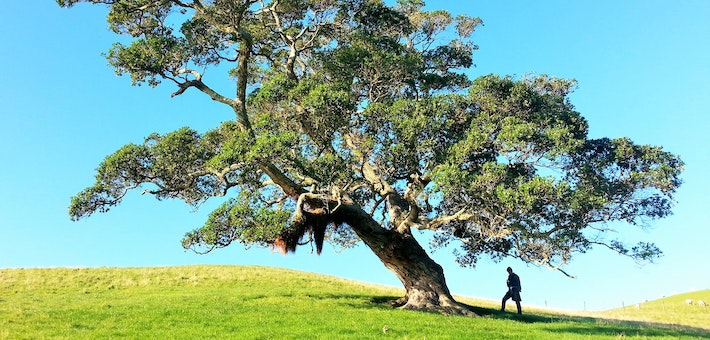Commentary on Ezekiel 17:22-24
The exile looms large in the Old Testament, and for good reason: it marked the symbolic and material destruction of everything that structured Judahite identity and faith. When Nebuchadnezzar ordered King Zedekiah blinded and deported to Babylon, and Zedekiah’s children publicly executed, he was trying to shatter any hope in the Davidic covenant, including YHWH’s promises to protect the Davidic king (see also 2 Samuel 7). In Nebuchadnezzar’s eyes, these upstart Davidic kings had twice rebelled against him by making alliances with Egypt, and they couldn’t be trusted anymore.
Nebuchadnezzar also destroyed the city walls of Jerusalem and reduced it to rubble in an attempt to silence the Judahite people’s brazen faith in YHWH’s promises to always protect and deliver the city (see also Psalms 46; 48). Moreover, Nebuchadnezzar looted, burned, and leveled the temple in Jerusalem in order to enact Babylonian domination over the deity of the Judahite people, thus (he imagined) ending their hope of deliverance.
In the wake of these simultaneous destructions, an acute crisis unfolded for the Judahites: what do we do now? Some doubted YHWH’s power, presence, concern, and even existence (see also Isaiah 40:27). Others were in denial that anything decisive had occurred, and continued to preach sunny optimism and a quick end to any discomfort (see also Jeremiah 27-29). Some wondered aloud if YHWH would ever again enter into a relationship with the people of Judah (see Lamentations 5:22), and doubtless some wondered if they would want to take YHWH up on such an offer, should it ever arrive.
The path forward for the Judahite people was confusing, fraught, and entirely unsure. Many political and cultural groups near Israel, such as the Philistines and the Moabites, seemed to disappear during the time of Babylonian domination precisely because they did not forge a new identity that could withstand the tumultuous changes in the wake of disaster. The survival of Judah beyond the destruction of Jerusalem was not a sure thing, in other words, and observers at the time would likely have bet on their dissolution and assimilation into stronger, seemingly more durable cultures and political entities.
Yet the Jewish people did persevere, and so did their faith in YHWH—and their confidence in Jerusalem, and even in the Davidic lineage. In the wake of God’s seeming absence, faithful Yahwists such as Ezekiel and Jeremiah provided new theological concepts and new practices that allowed for the reformulation of Judahite identity and faith despite the lack of a temple, a clear geographic center, a leadership structure, or an ordained priesthood. They renegotiated these older ideas instead of abandoning them. Insofar as we can imagine a response to the disaster of the exile and the emergence of the Jewish people as a group strong enough to survive in diaspora, it is because of the courage and inspired prophetic imaginations of such leaders.
Ezekiel is not often found in the lectionary—and perhaps for good reason; it’s a difficult book that deals explicitly with trauma in ways that one must handle carefully (especially the complicated imagery in Ezekiel 16 and 23, both of which deserve a warning label). Yet it also contains deeply thoughtful ethical and theological reflection which has much to offer in light of contemporary feelings of displacement, disenchantment, and hopelessness. In recent months, we have had to live through several ongoing crises, and in the coming years we will doubtless face more.
Ezekiel 17 concerns this miraculous event of the survival of the Jewish people beyond the event of Jerusalem’s destruction. It begins with an allegorical poetic riddle about a great eagle who takes the top of a giant cedar tree and transplants it to a distant urban area with rich soil and plentiful water, where it flourishes and sets down roots—but then yearns to be transplanted yet again by another eagle, which leads to its untimely withering (verses 3-10). The allegory is followed by an explanation: the first eagle refers to Nebuchadnezzar, whom God has hand-picked to rule over Judah with some of the leaders taken into exile in Babylon (referring to the first round of deportations in 597 BCE; verses 11-14). Then Ezekiel identifies the second eagle: it is Egypt, who has been tempting the Judahites to rebel against Babylon and enter an alliance with Pharaoh, which God says is doomed to fail (verse 15).
After the allegory and its explanation, God issues two divine oaths (verses 16-18; 19-21). The first warns the Judahite king, Zedekiah, that joining in an alliance with Egypt, and thus distrusting God’s promises given by Ezekiel and Jeremiah, will lead to his own death in Babylon. The second declares that Zedekiah’s rejection of Babylon’s covenant will end in the unavoidable destruction of Jerusalem and its temple.
At this point, with the Davidic royal line in shambles and the city of Jerusalem razed to the ground, there would appear to be no hope. The prophets speak in unremitting honesty, and give room for the full weight of grief—something the lectionary seems to have little time to dwell on, as seen in this week’s readings. We often skip straight to the inevitable words of hope that can always be found in prophetic books, but we would do well to remember the pain and sorrow of what the people had endured as they strained to hear the words of the good news. And in the middle of the political, social, and theological turmoil of the waning days of the Judahite kingdom, Ezekiel proclaimed God’s soaring promise of salvation: the story of the eagle and the cedar transplant was not finished. In verses 22-24, Ezekiel declares that God will take another clipping from that mighty and noble cedar tree and will plant it in a safe place high on a mountain—namely Mount Zion, the very place that sat abandoned for decades.
The newly planted Judah will not seek its own abundance, nor will it be consumed with anxious thoughts of self-defense: instead, it will flourish as a safe and nurturing place for “every kind of bird” that might alight in its full and aromatic branches (verse 23). Ezekiel depicts God’s grace as generative and life-giving to all the earth. This verse echoes with the great promise of Genesis 12:3: namely, that all the nations in the world will be blessed through the family of the promise. And finally, all the trees of the forest will know that YHWH is the sovereign source and author of all that lives (verse 24). YHWH focuses on the divine power to give and to take life, to build up and to tear down (echoing Jeremiah 1:10). In other words, God’s power can be seen in the shocking reversals and upheavals that upend all of our expectations and our assumptions about power and prestige.
This text is paired with the Gospel reading of Mark 4:26-34, which features two plant-based parables about the kingdom of God. The first parable concerns the surprising and shocking generative work of the natural world that exceeds the resources of human agency and comprehension, but that nevertheless sustains all of us (verses 26-29). The second describes the shocking ability of a tiny mustard seed to become a great tree which provides protection and space for all the birds of the air (verses 30-32). Jesus’ parables in Mark 4:26-32 resonate with the themes found in Ezekiel 17:22-24, but they take on greater depth and power when set within the larger story found in Ezekiel 17:1-21.


June 13, 2021